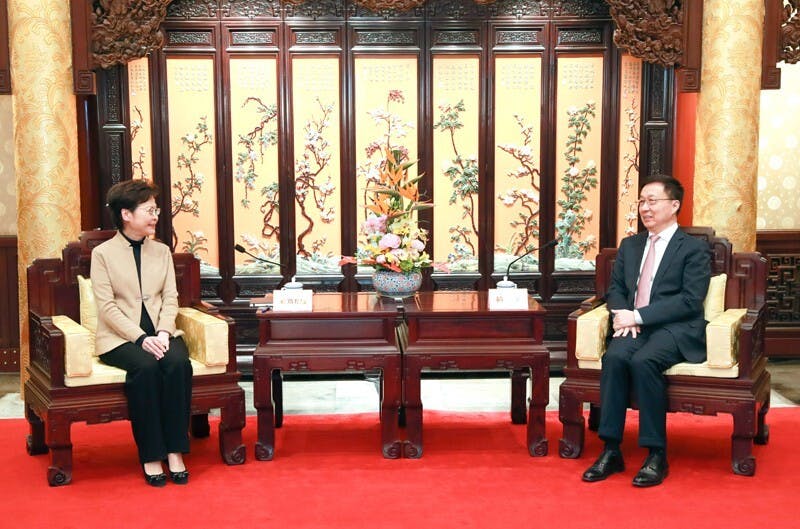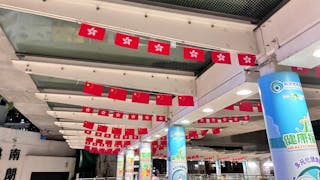根據全國人大常委會副委員長王晨3月5日作出《關於全國人民代表大會關於完善香港特別行政區選舉制度的決定(草案)》,的說明,以及該決定(草案)與立法會的新組成,顯示中央當局決心「重塑」由行政長官主導的政治體制,該體制由管理香港特別行政區的愛國精英領導。
改革選委會 加強行政主導
該決定(草案)有以下幾個特點;首先,它概述了「完善」香港選舉制度的思路,包括對現有選舉委員會及其組成的改進;第二,香港特別行政區行政長官將繼續由選舉委員會選出; 第三,選舉委員會的權力將得到擴大,使其有權選擇「較大比例的立法會議員」,這意味着從選舉委員會選舉產生的立法會議員人數可能會比任何其他現有組別都要大, 包括立法會的功能組別和地區組別。 第四,選委會將直接提名所有立法會議員候選人; 第五,預計選委會將在擴大香港社會「均衡有序的政治參與和更加廣泛的代表性」方面發揮重要作用;第六,選委會可以篩選立法會議員候選人。
簡單來說,通過賦權新改革的選舉委員會,中央政府將實現本身的目標,即加強香港特別行政區行政主導的政治體制,並讓更多愛國精英進入立法會、篩選立法會議員候選人,並在政治上發揮主要作用,以穩定香港立法機關的內部運作。
決定草案規定了完善香港選舉制度的五項原則:一是全面準確貫徹一國兩制,港人治港、高度自治的方針;二是堅定維護國家主權安全發展利益;三是堅持依法治港;四是符合香港實際情況;五是提高香港特別行政區治理效能。這五項原則對於貫徹「愛國者治港」至關重要。
決定(草案)將通過修訂香港《基本法》附錄一和附錄二來實現。 修訂《基本法》附錄一和附錄二將是「完善香港選舉制度」的第一步。第二步將包括兩個要素:全國人大常委會將對香港特別行政區「新的民主選舉制度」作出具體規定;香港特別行政區將相應修改與《基本法》附錄一和附錄二修訂版本有關的本地法律。
香港政治生態仍存變數
人大「重塑」香港的選舉制度,其目標歸根究柢,正如國務院總理李克強在《政府工作報告》中所說,是為了「堅決防範和遏制外部勢力干預」香港事務。中共中央政治局常委、全國人大常委會委員長栗戰書也表示,提交全國人大會議審議的《關於完善香港特別行政區選舉制度的決定(草案)》,符合憲法和香港《基本法》,符合香港根本利益和長遠利益,「一定會得到包括香港同胞在內的全國各族人民的支持」。
總結而言,全國人大會議重新設計了香港選舉制度,主要目標是重申香港特別行政區是由行政主導、防止激進分子進入立法機關和行政長官選舉委員會。行政長官選舉委員會取消了區議會席位及其影響力,懲處了威脅立法會政治權力的反對派,並在未來幾年內使香港政治生態恢復穩定。
然而,「完善香港選舉制度」一些可能的後果包括部分選民或會質疑立法會選舉還有何意義?選民投票率是否因此而受到抑制?以及反對派的某些成員是否會由於政治空間收窄而在未來的示威活動中冒險採取「游擊式」的策略?儘管「愛國者」一定很高興在這種「恩庇侍從制度」下享有政治特權,但「愛國者」的內部是否團結,會不會產生分裂和互相競爭,則仍須繼續觀察。
NPC Redesigns Hong Kong’s Legislative Council: Significance and Implications
Judging from the draft decision of the National =People’s Congress (NPC) of the People’s Republic of China (PRC) on Hong Kong’s electoral system, as presented by NPC deputy director Wang Chen on March 5, together with Hong Kong-based reports on the new composition of Legislative Council (LegCo), the central authorities are determined to redesign an executive-led political system led by the patriotic elites governing the Hong Kong Special Administrative Region (HKSAR).
The draft decision has several characteristics. First, it delineates the line of thinking on the “perfection” of Hong Kong’s electoral system, including the improvement of the existing Election Committee and its composition. Second, the Election Committee will continue to select the Chief Executive of the HKSAR. Third, the powers of the Election Committee (EC) will be expanded by being empowered to select “a larger proportion of LegCo members,” implying that the number of legislators to be returned from the EC will likely be larger than any other existing sectors, including functional constituencies and geographical constituencies in the LegCo. Third, the EC will directly nominate all LegCo members. Fourth, the EC is expected to play a crucial role in expanding the “balanced” participation and “comprehensive representation.” Fifth, the EC will be able to screen LegCo candidates.
In short, by empowering a newly reformed EC, the central government will achieve its objectives of enhancing the executive-led political system in the HKSAR and allowing more patriotic elites to enter the LegCo, screen LegCo candidates, and playing a politically preponderant role to stabilize the internal operations of the Hong Kong legislature.
The draft decision lays down five principles of the electoral reforms: accurately implement the tenet of “one country, two systems” and “Hong Kong people governing Hong Kong;” maintaining and protecting national sovereignty, security and developmental interests; governing Hong Kong in accordance with the law; making the electoral system suitable for Hong Kong circumstances; and elevating the governing capacity of the HKSAR. These five principles will be crucial in the implementation of “patriotic people ruling Hong Kong.”
The draft decision will be implemented by amending the existing appendices 1 and 2 of the Hong Kong Basic Law. This amendment will be the first step to “perfect” the electoral system of the HKSAR. The second step will be composed of two elements: the NPC Standing Committee will have concrete stipulations on the “new democratic electoral system” of the HKSAR; and the HKSAR will amend the local ordinances related to the implementation of the amended appendices 1 and 2 of the Basic Law.
The overall thrust of the NPC’s draft decision to redesign the Hong Kong electoral system aims at, as Premier Li Keqiang pointed out in his speech delivered in his government work report, “resolutely preventing and curbing foreign forces to intervene” in Hong Kong affairs. Li Zhanshu, a member of the Standing Committee of the Politburo, remarked on March 5 that the draft decision is in conformity with the PRC constitution and the Hong Kong Basic Law, and that the amendment and redesigned electoral system “must obtain the support of the citizens of the entire nation, including the Hong Kong and Macau comrades.”
In response to the initiatives made by the NPC to redesign and reform Hong Kong’s electoral system, the Hong Kong Chief Executive Carrie Lam said on March 5 that the HKSAR government will amend the local legislation in accordance with the changes in the electoral system, that the idea of patriots governing Hong Kong is natural, that the central government in the past two years helped Hong Kong solve many imminent issues, and that she will lead the government and her governing batch to “implement without fear the vision of protecting the nation’s basic interests and Hong Kong’s prosperity and stability.”
There were two Hong Kong-based reports on the new composition of the LegCo. According to TVB news, the new 90-member LegCo will be composed of three sectors: 30 members (33.3 percent) from geographical constituencies; 30 members (33.3 percent) from functional constituencies; and 30 members (33.3 percent) from the new Election Committee. However, HK01 reported that the new 90-member LegCo will have 20 members (22.2 percent) elected from geographical constituencies; 30 members (33.3 percent) from functional constituencies; and 40 members (44.4 percent) from the Election Committee. If the draft decision says that the Election Committee will return a “larger proportion” of LegCo members, it looks as if the new composition as reported by HK01 will likely be more accurate.
According to the Hong Kong Apple Daily on March 6, the two possible composition of LegCo as mentioned in TVB news and HK01 will produce a legislature with a smaller proportion of directly elected members in comparison with the current composition of Macau’s Legislative Council. At present, the Macau Legislative Council has 33 members in which 14 of them are directly elected (42.4 percent), 12 of them returned from functional groups (36.4 percent), and 7 appointed by the Chief Executive (21.2 percent).
In other words, if the Hong Kong LegCo will have 90 members in which 40 of them will be returned from the new Election Committee, 20 returned from direct elections, and 30 from functional groups, this set-up will likely be more politically “conservative” than the current Macau legislature.
Furthermore, the election method of legislators to be returned from geographical constituencies in the HKSAR may be changed from the current proportional representation system to “double seats single vote,” meaning that the democrats will find it relatively difficult to grasp more than 10 seats in the 20 directly elected seats, given the approximately 55 percent share of votes by the democrats versus the almost 45 percent share of votes by the pro-government and pro-Beijing forces.
Most importantly, the new Election Committee, according to Hong Kong news reports, will be composed of women federation, overseas Chinese federation, the Hong Kong association of the Chinese People’s Political Consultative Conference (CPPCC), and other pro-Beijing social interest groups. As such, it can be anticipated that the Election Committee will be composed of almost all patriotic elites, who will be empowered considerably to ensure that the LegCo will be occupied by the patriots.
The most important political significance of the NPC’s redesign of Hong Kong’s legislature is that the central authorities are determined to stop all those localists and radicals from entering the LegCo through direct elections. The October 2016 oath-taking saga in the Hong Kong LegCo was politically unacceptable to the central government, leading to the interpretation of the Basic Law’s Article 104 that requires legislators-elect to take the oath faithfully and respectfully. The 2019 anti-extradition movement, according to Wang Chen in his speech on March 5, was also politically unacceptable, for “foreign forces” intervened in Hong Kong affairs and provided “protective umbrella” for the elements who were “anti-China and causing chaos” in the HKSAR. In short, from the NPC perspective, Hong Kong’s electoral system must be redesigned to prevent all the politically undesirable elements from penetrating into the local polity.
Under the newly reformed electoral system, District Councils and their members will no longer be allowed to return five legislators from the so-called super seats that were previously composed of candidates who were nominated by District Council members and were then directly elected by eligible voters.
The results of the November 2019 District Council elections, which witnessed the victory of many democrats in 17 of the 18 District Councils, would become politically insignificant because there would no longer be 117 district councilors who under the previous system could be elected among all district councilors and who could go into the Election Committee that would elect the Chief Executive.
Another significance is that, if the HKSAR has its own style of democracy, as mentioned by the PRC authorities and patriotic elites, then it is up to the NPC – China’s law-making body – to reform Hong Kong’s political system instead of allowing the people of Hong Kong to redesign their political structures. If “parliamentary sovereignty” is a concept in the British system, it is also practiced in the PRC’s redesign of the Hong Kong electoral system.
The political implications for Hong Kong are far-reaching. First, the objective of achieving universal suffrage, if it is defined in the Western concept of “one person one vote,” will be quite remote. Second, the democrats should perhaps regret that they were hijacked by the radicals in the summer of 2015 to reject the 2015 political reform plan proposed by the HKSAR government and supported by the central authorities, namely allowing Hong Kong people to vote for their Chief Executive after 2 to 3 candidates would be screened out by an Election Committee. Unless the local democrats will learn to be far more realistic than ever before, the path of achieving universal suffrage will be quite difficult in the long run. Third, both the democrats and radicals should reflect on their excessively provocative behavior, including the lack of condemnation on political violence in the 2019 anti-extradition movement, and the unnecessary organization of a so-called primary elections to select candidates among the pan-democratic camp even after the enactment of the national security law in June 2020. All these moves were politically provocative, angering the central authorities to the extent that a “reversal” of the political system of Hong Kong back to the mid-1980s, when the electoral college of the LegCo was prominent, becomes a fait accompli.
The final implication of the new electoral system is that while the patriotic elites will be increasingly politically influential, their internal unity would not be an easy task. Given the fact that the Election Committee will be composed of all pro-Beijing elites, their internal fragmentation and competing interests will likely be a crucial indicator of pluralistic politics within an executive-led polity.
In conclusion, under the Chinese-style “parliamentary sovereignty,” the Hong Kong electoral system is now redesigned by the National People’s Congress with several key objectives: reasserting Hong Kong’s executive-led system, preventing the radicals from entering into the legislature and the Chief Executive Election Committee, eliminating the political ascendancy and influences of the directly elected District Council members, punishing the political opposition that threatened to “usurp” political power in the LegCo, and restabilizing the entire Hong Kong political system in the coming years. The unintended consequences of the new electoral design are whether some voters will see LegCo elections as meaningful, whether the voter turnout will be dampened, and whether some members of the political opposition will be forced by the limited political space to resort to the risky guerrilla-style tactics of protests in the coming year. While the patriotic elites will surely enjoy their political privileges under a patron-clientelist system, their internal unity, fragmentation and rivalry remain to be observed carefully.
原刊於澳門新聞通訊社(MNA)網站,本社獲作者授權轉載。




































